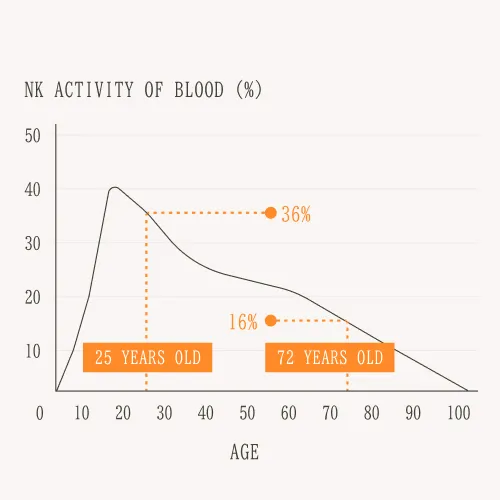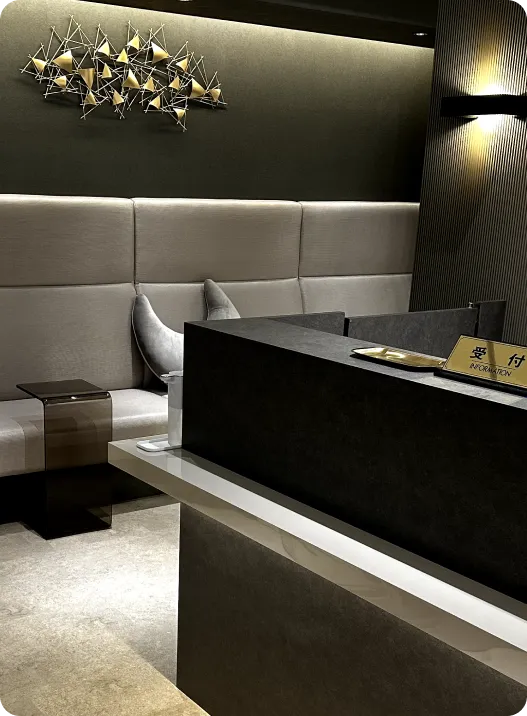Book Appointment
After your inquiry, our staff will schedule your visit and confirm your reservation.



Immunotherapy is a treatment method that enhances immunity by multiplying and activating various immune cells through cell culture, which are then reintroduced into the body. Due to the need for cell processing, it is classified as regenerative medicine. Artisan Clinic Hibiya has obtained Codes of the Plans for the Provision of Regenerative Medicine for immunotherapy using different types of immune cells, including NK cells, dendritic cells, alpha-beta T cells, and gamma-delta T cells.

NK cells, or “Natural Killer Cells", are responsible for identifying and attacking abnormalities in the body. However, their immune activity often declines with aging or stress, weakening the immune system and increasing the risk of various diseases.
NK cells have the highest cytotoxic activity against cancer cells among immune cells. We collect your blood, culture and activate the NK cells, and then reintroduce them into your body. This method enhances your body's natural immune cells, minimizing stress on the body while safely targeting cancer and infectious diseases. An additional benefit of this treatment is its ability to complement other cancer and infectious disease therapies. This cycle, if repeated periodically, will build up a very high level of immune strength that enhances overall health, and improve the body’s capacity to fight diseases.

Natural Killer (NK) cells are a type of lymphocyte related to T and B cells, arising from a common progenitor. However, as part of the innate immune system, NK cells are classified as group I Innate Lymphoid Cells (ILCs) and are known for their rapid response to various pathological threats. They are most recognized for destroying virus-infected cells and detecting as well as controlling early signs of cancer. Besides their role in immune defense, specialized NK cells are also found in the placenta, suggesting a potential role in pregnancy.
NK cells were initially identified for their ability to destroy tumor cells without requiring prior activation or priming, unlike cytotoxic T cells that need to be primed by antigen-presenting cells. This innate ability to kill cells gives NK cells their name. In addition to their cytotoxic functions, NK cells secrete cytokines such as IFNγ and TNFα, which activate other immune cells, like macrophages and dendritic cells, to boost the immune response.
As they patrol the body, NK cells continuously interact with other cells. Whether an NK cell decides to kill a particular cell depends on signals from activating and inhibitory receptors on its surface. Activating receptors detect molecules present on the surface of infected or cancerous cells, triggering the NK cell to respond. Inhibitory receptors, on the other hand, serve to prevent unnecessary cell killing. Most healthy cells display MHC I molecules, marking them as‘self', which are recognized by the NK cell's inhibitory receptors, preventing them from attacking. However, infected or cancerous cells often lose their MHC I expression, making them more susceptible to NK cell-mediated killing. Once an NK cell is activated to kill, it releases cytotoxic granules containing perforin and granzymes, which lead to the destruction of the target cell.

The genes encoding both MHC I and the NK cell inhibitory receptors that recognize them show significant variation between individuals. The specific alleles a person carries for these genes have been associated with their ability to combat HIV infections and their susceptibility to certain autoimmune diseases. NK cell characteristics also change with age and can be influenced by chronic viral infections, such as cytomegalovirus (CMV).
Due to their tumor-killing capabilities, NK cells are an appealing focus for cancer immunotherapies. Some monoclonal antibody therapies rely on NK cells to eliminate cancer cells. In addition, researchers are exploring treatments that activate NK cells using small molecules or cytokines and are even testing genetically engineered NK cells as potential therapies.
Even individuals in good health can have an immune age that surpasses their chronological age. At our clinic, we provide immunity assessments to determine your current immune status, enabling you to track and enhance your immune function through immunotherapy.In addition to NK cells, we offer immunotherapy using a range of immune cells, including dendritic cells, alpha-beta T cells, and gamma-delta T cells, under our regenerative medicine provision plan. Our expert physicians will recommend the most appropriate treatment based on your health condition.

i. Improving your health by boosting your body's natural healing capabilities
ii. Prevent cancer or virus infection

i. Prevent cancer from relapsing or metastasizing
ii. Induce immune strength against cancer

i. Enhance rehabilitative effects through synergy
ii. Reduce the side effects of chemotherapy

i. Delay cancer progression
ii. Improve a prognosis or overall quality of life
A license is required to provide regenerative medicine In order to provide regenerative medicine, based on the Act on Ensuring the Safety of Regenerative Medicine, a specific authorized regenerative medicine committee has It must be reviewed by the Ministry of Health, Labor and Welfare and accepted by the Ministry of Health, Labor and Welfare. Artisan Clinic Hibiya is a medical institution that has been accepted by the Ministry of Health, Labor and Welfare for a provision plan for knee joint stem cell administration.



After your inquiry, our staff will schedule your visit and confirm your reservation.

After you complete the questionnaire, the doctor will explain stem cell treatment and recommend a plan suited to your health condition.



Stem cells are harvested from abdominal or buttock fat. 20 grams of adipose (fat) cells are extracted and it can be cultivated into 20 sessions of stem cell therapy. There is only a very small wound of 1 cm to harvest the fat.

We will culture stem cells and exosomes over about 4 weeks. To maintain optimal conditions, please avoid changing or canceling the administration date once scheduled.



For Intravenous Drip: Disinfect > Confirm injection site > Insert needle > Secure tubing.
Duration: 40-60 minutes.

Before leaving, our staff will provide post-treatment instructions. You may go home the same day, but please avoid driving for safety. Contact us with any concerns, and our team will respond promptly.


You can expect to feel the effects within 3 to 6 months.

No dietary restrictions are required for this examination.

Stem cells are distributed throughout the body. While adipose (fat) tissue has traditionally been known for its high concentration of stem cells, advancements in cultivation technology now allow for equal or even greater stem cell yields from skin and subcutaneous fat. Recognizing that patients may be hesitant about liposuction, our clinic instead collects stem cells from subcutaneous fat under the skin.

Since stem cells are collected from subcutaneous skin fat, cultured, and then administered, it is possible to increase the number of stem cells and deliver significant benefits to the body. As a result, stem cell therapy can effectively promote body revitalization, even in older individuals. Additionally, age-related diseases, which stem from the weakening of tissues, are becoming more common. We offer stem cell therapy as a solution for anti-aging and to address these age-related conditions.

For cultured stem cell therapy, blood and skin tissue are collected, and only the stem cells present in the tissue are extracted and cultured. The culturing process takes about one month, after which the stem cells are ready for administration. If administered via intravenous drip, the procedure takes about 40 to 60 minutes. Skin extraction is performed under local anesthesia, making the process similar to a dental procedure. The tissue collected is about 5 mm in size, and after a month, the area will heal and be barely noticeable.

We will provide a thorough explanation. The key to receiving stem cell therapy is to fully understand the doctor’s explanation. If you have any questions or uncertainties, feel free to ask, and make sure you are well-informed before giving your consent.

Stem cell therapy does not cure cancer. However, it can help restore weakened areas caused by cancer or its treatments. It may enhance the body's ability to rejuvenate and improve its ability to combat remaining cancer cells.

Three research groups initially suggested that stem cell culture might lead to cancer, but later studies have shown that stem cells do not become cancerous even after being cultured. Source: Science Magazine.

Homing refers to the process by which cells move to specific areas in the body that require regeneration, triggered by certain physiological signals. The "homing effect" of stem cells occurs when they are released into the body and automatically locate areas in need of repair. When administered intravenously, stem cells enter the peripheral blood circulation, travel through the lymphatic and blood systems, adhere to the vascular endothelium, invade the tissue, and then proliferate and differentiate into the necessary target cells.

After treatment, you can go home shortly afterward. The incisions are small, and you can shower on the same day, allowing you to resume your normal activities. We prioritize wound care and pain management, providing follow-up support through phone calls and other means to ensure your comfort.

There have been reports of death from pulmonary embolism following stem cell administration in Japan (cause not confirmed) and blindness after intraorbital administration in the United States. While cell therapy carries an inherent risk of pulmonary embolism, our hospital prioritizes safety through strict quality control and careful administration methods. To date, no serious complications have been reported at our facility.










